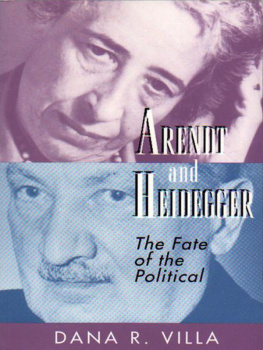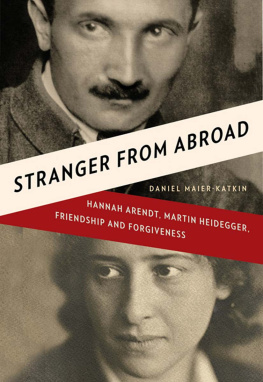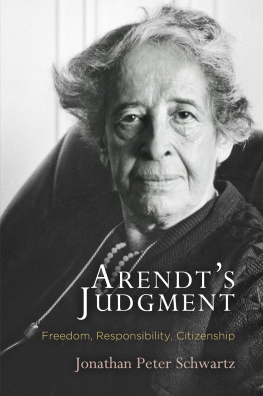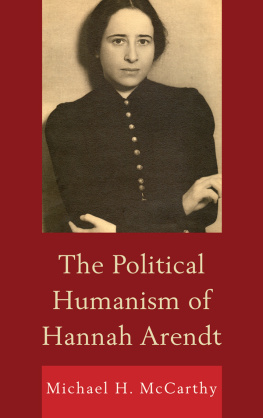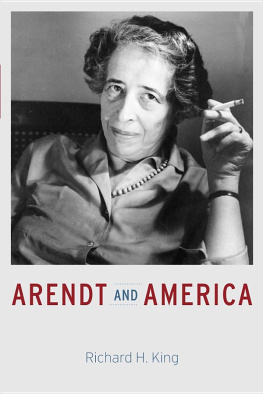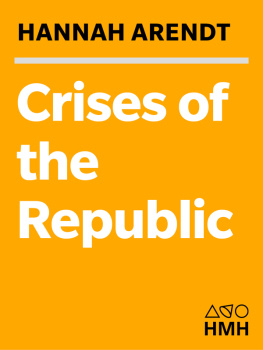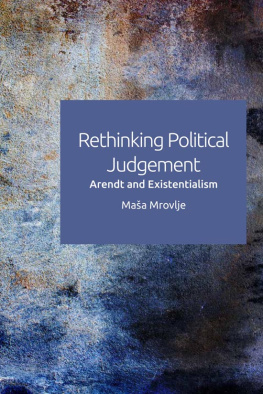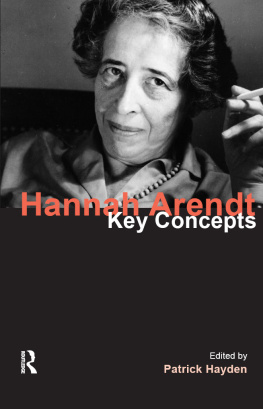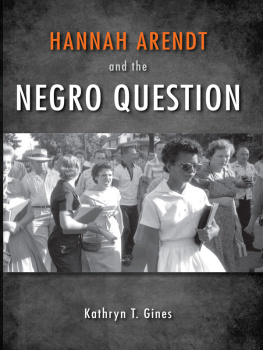INTIMATE STRANGERS
INTIMATE STRANGERS
Arendt, Marcuse, Solzhenitsyn, and Said in American Political Discourse
ANDREEA DECIU RITIVOI
Columbia University Press
New York

Columbia University Press
Publishers Since 1893
New York Chichester, West Sussex
cup.columbia.edu
Copyright 2014 Columbia University Press
All rights reserved
ISBN 978-0-231-53791-9 (e-book)
Library of Congress Cataloging-in-Publication Data
Ritivoi, Andreea Deciu, 1970
Intimate strangers : foreign intellectuals and American political discourse / Andreea Deciu Ritivoi.
pages. cm
Includes bibliographical references and index.
ISBN 978-0-231-16868-7 (cloth : alk. paper) ISBN 978-0-231-53791-9 (e-book)
1. Politics and cultureUnited StatesHistory20th century. 2. IntellectualsUnited StatesHistory20th century. 3. RhetoricPolitical aspectsUnited StatesHistory20th century. 4. United StatesIntellectual life20th century. 5. Arendt, Hannah, 19061975Influence. 6. Marcuse, Herbert, 18981979Influence. 7. Solzhenitsyn, Aleksandr Isaevich, 19182008Influence. 8. Said, Edward W.Influence. I. Title.
E169.12.R538 2014
320.97309'049dc23
2014003432
A Columbia University Press E-book.
CUP would be pleased to hear about your reading experience with this e-book at .
Jacket design by Julia Kushnirsky
Jacket illustration by R. Kikuo Johnson
References to websites (URLs) were accurate at the time of writing.
Neither the author nor Columbia University Press is responsible for URLs that may have expired or changed since the manuscript was prepared.
It is a mistake to think of the expatriate as someone who abdicates, who withdraws and humbles himself, resigned to his miseries, his outcast state. On a closer look, he turns out to be ambitious, aggressive in his disappointments, his very acrimony qualified by his belligerence. The more we are dispossessed, the more intense our appetites and our illusions become.
E. M. CIORAN, THE TEMPTATION TO EXIST
CONTENTS
AFTER MAJOR flooding in the region where I live, my husband and I went to a food bank in a nearby church to donate food for the victims. We brought a large box of canned goods and left it in the car as we went scouting for the entry. We asked a member of the church staff where the food bank was, and she pointed to the back of the building, adding that we would have to return the next morning to receive food. I was initially confused by her answer, but then I realized she had assumed we were there to ask for food, not to donate it. My husband and I both look like white middle-class Americans. We are also immigrants. Her clue was our accent, which trumped race and class and, in her eyes, made us into indigent foreigners at the mercy of their hosts.
While this is a book about the negative representations of foreigners in American public and political discourse, I could have written a much different one about the welcoming reception of foreigners in American academic institutions based on my own experience. I have benefited not only from many suggestions offered by my colleagues and students at Carnegie Mellon University but also, and perhaps most important, from their openness and generosity. Unlike the protagonists of my book, who were often dismissed as unreliable and uninformed even though they were illustrious scholars and artists, I have been fortunate to have not only the intellectual trust of my colleagues but also their support and encouragement. My special thanks go to David Kaufer, former head of the English department at Carnegie Mellon University, who has a unique talent for helping me to understand my own thoughts better so I can write them down and whose faith in me has been one of the strongest motivations in my entire academic career; also to Roger Rouse, who taught me the most important lesson in collegiality and intellectual generosity by not only reading my manuscript with utmost care but also discussing it with me as the book I wanted to write and not the book someone else could have written; to Jon Klancher, who showed me, with pointed but ever so elegant comments, how to look at my work with the eyes of a cultural historian (which does not necessarily mean that I managed to do it successfully here); to Kathy Newman, for reading a draft of my manuscript in a very early stage and still seeing a book in it and for making me think about how to write in a way that puts individuals in the center, rather than their ideas; to Fred Evans, for the many stimulating exchanges we have had about political philosophy during our fruitful collaborations and for being such a model of erudition, passion, and kindness; to Peggy Knapp, with whom I share a secret love for the history of ideas, especially the ideas discussed in this book; to Jeffrey Williams, for asking me tough questions and suggesting some possible answers; to David Shumway, who suggested I look more deeply into Camuss Stranger (I did and it influenced my thinking even though I make no specific references to that novel here). My students at Carnegie Mellon are the most valuable resource I have had access to at this university. They have read drafts of my chapters and provided tremendous insight as well as motivated me with their excitement about the topic. My graduate research assistants have offered invaluable help, especially David Tucker at the beginning of the project and Emily Lane Ferris in the final stage. I am also grateful to Joe Monte who made useful editorial suggestions and inspired me, with his polite yet probing questions, to see more connections between the four exceptional immigrants that are the subject of this book, and immigrants in general.
This project has received summer support from the National Endowment for the Humanities, for which I am grateful. I thank my department head, Christine Neuwirth, and the dean of the Dietrich College of Humanities and Social Sciences, John Lehoczky, who supported my application for the NEH grant and my research over the years. I presented parts of this book to the research group on migrants and recognition at Carnegie Mellon University in 2010, with its members, Paul Eiss, Roger Rouse, Jennifer Gully, David Shumway, Lara Putnam, Richard Maddox, and Fred Evans, and received important and useful suggestions, and at the Center for Interpretive and Qualitative Research at Duquesne University in 2011, where I was pleased to discover a much more thoughtful response to Solzhenitsyns Harvard address and my analysis of it than Solzhenitsyn received himself in the 1970s. Khalil Barhoum from Stanford University read my chapter on Edward Said, who was a close friend of his, and provided much encouragement for my analysis of Saids political agenda (although I am solely responsible for the claims I make in this book). And thank you to Alan Gross, for believing in me and inspiring me, no matter how far I strayed from the doctoral work I pursued under his mentorship at the University of Minnesota. Two old and very close friends deserve my deepest gratitude, not just for this project but for all of my scholarly pursuits: Michael Krausz, who has been a role model for me, albeit one impossible to emulate entirely, and Clin-Andrei Mihailescu, whose vivaciousness and brilliance are matched by an incredible generosity and kindness. At Columbia University Press, I was fortunate to work with a patient and experienced editor, Wendy Lochner, and with her dedicated assistant, Christine Dunbar. I deeply appreciate their support and help. Michael Haskell and Margaret Puskar-Pasewicz offered invaluable technological and editorial assistance in the final stage of the process.
Finally, my gratitude to my family is hard to express in a few sentences. If it had not been for my mother, I would probably have been completely overwhelmed with the challenges of being a new mother myself when I started this book and required many more years to finish it. My father was patient and supportive while my mother spent months staying with us and helping in so many ways. My husband, Milu, is my lucky star. He was the first one to hear me talk about this project, on our first night out after the birth of our daughter, and he continued to support me in endless ways, hearing me read paragraphs out loud, listening and responding to my ideas, and helping me with his technological wizardry. I truly am most grateful of all to my daughter, Anouk, for offering to do illustrations for my book (even though I did not take her up on it) and to my son, Luca, for telling me to go work after I tucked him in every night. My children were born in America, and I am grateful to both of them for speaking English with me every day yet never hearing my accent.
Next page


